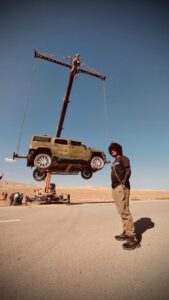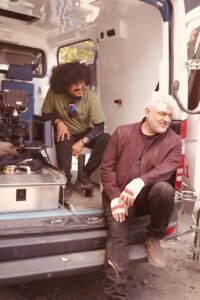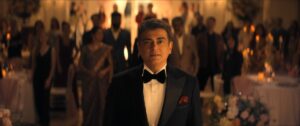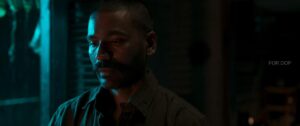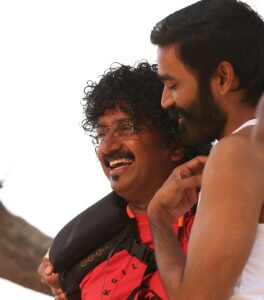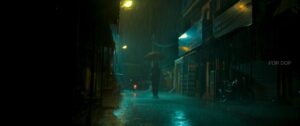
In Conversation :Om Prakash ISC
Feb 09 2025
Cinematographer Om Prakash on Capturing the Visual Essence of Vidaamuyarchi
Cinematography is an art of visual storytelling, where each frame must evoke emotion while serving the narrative. In Vidaamuyarchi, a gripping action thriller with deep emotional undercurrents, Om Prakash orchestrates a cinematic experience that balances high-octane action with intricate drama.
With a filmography that spans from the period realism of Vaagai Sooda Vaa to the glossy action of Aarambam and the grandeur of Nee thane En Ponvasantham, Om Prakash is a master of visual versatility. His collaboration with director Magizh Thirumeni and superstar Ajith Kumar in Vidaamuyarchi is one of his most ambitious projects yet. In this in-depth discussion, he delves into the challenges of crafting the film’s stunning color palette, seamless action sequences, large-format cinematography, and groundbreaking car chase that blends exterior and interior shots flawlessly.
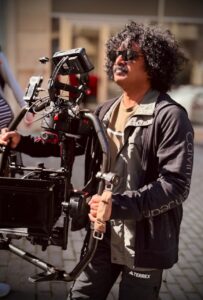
Crafting the Visual Language of Vidaamuyarchi
Q: How did you define the overall visual tone of Vidaamuyarchi?
A: The film is an action thriller, but it’s layered with human emotions. I wanted the visuals to amplify both the scale and intimacy of the story. The landscapes aren’t just backdrops; they shape the mood and tension of the film.
I drew inspiration from classic adventure thrillers like Mackenna’s Gold, where vast terrains enhance the protagonist’s isolation. The goal was to create a sense of epic scale while keeping emotional moments raw and grounded. The environment itself becomes a silent character, adding weight to the drama.
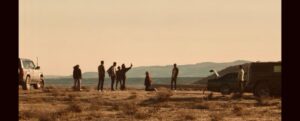

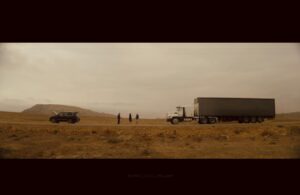
Q: What was the biggest challenge in shooting across different seasons?
A: The script is set in peak summer, but we filmed over three seasons at Azerbaijan
The unpredictable weather posed a huge challenge, especially in maintaining color temperature consistency.
The natural light would shift between 10,000K (harsh daylight) and 3,000K (overcast or morning shots), requiring constant adjustments. I used color correction filters and a precise color temperature meter to balance the shifting tones. Every outdoor shot needed careful monitoring to ensure visual continuity.
Innovative Action Cinematography – The Groundbreaking Car Chase
Q: Vidaamuyarchi features a unique car chase sequence. Can you break down how it was shot?
A: This is one of the most ambitious sequences I’ve ever shot. It’s a high-speed car chase where the protagonist moves seamlessly between exterior action and interior close-ups—without using a body double.
The exterior chase was filmed on location with real vehicles performing complex stunts, while the interior driving shots were matched perfectly using green screen technology. The trick was to ensure that lighting, reflections, and motion matched flawlessly so that both segments felt like they were happening simultaneously.
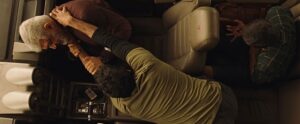

Q: How did you ensure the interior shots looked realistic?
A: We built a replica of the car interior on a gimbal-controlled rig. This allowed us to synchronize camera movements with the motion of the real car chase. We also used interactive lighting to mimic passing speed, reflections, and flashes of day light.
The reflections in the windshield and car windows matched perfectly. The result is a seamless blend between practical stunts and green screen work, creating a completely immersive chase sequence.
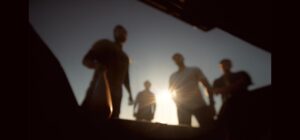

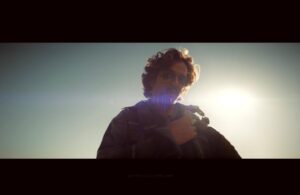
Lighting & Camera Innovations
Q: You mentioned a high-contrast, low-key lighting approach. Why did you choose this?
A: The film’s core conflict is about good versus evil, and I wanted that duality to be reflected in the lighting.
- For intense action sequences, I used deep shadows and strong highlights, enhancing the tension.
- For emotional moments, I softened the contrast, allowing the warmth of the characters’ emotions to come through.
VistaVision’s expansive framing inspired me to use wide compositions that immerse the audience in the landscape while maintaining an intimate feel for the character-driven scenes.
Q: What camera and lenses did you use for Vidaamuyarchi?
A: I shot with the Alexa LF, which excels in capturing the depth and detail of vast landscapes. Its large-format sensor was crucial for preserving the film’s rugged yet cinematic aesthetic.
For lenses, I chose Cooke Full Frame Anamorphic/i FF. These lenses were perfect for capturing the raw textures of the environment—from sandstorms to dust and wind—while maintaining a natural softness that complemented the film’s dramatic tone. The gentle roll-off on highlights and organic feel of Cooke lenses gave the film a distinct poetic touch.
Collaborations & Contrast with Raayan
Q: How was your experience working with Ajith Kumar ?
A: Ajith sir is a cinematographer’s dream actor. He understands framing, lighting, and technical aspects so well that he instinctively positions himself for the best shot. His ability to execute high-risk stunts without a body double made our action sequences feel even more visceral.
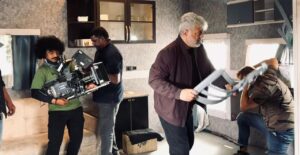
Crafting the Color Palette of Vidaamuyarchi
Q: How did you develop the film’s unique color scheme?
A: Vidaamuyarchi demanded a visual tone that balanced the grit of an action thriller with the emotional depth of a family drama. I wanted a warm yet natural look, somewhere between sepia and earthy golden hues, while maintaining a sense of realism.
Before production, I worked closely with colorist Prasath Somasekar to develop a custom LUT (Look-Up Table). This LUT was designed to preserve the warmth of sunlit terrains while subtly desaturating blues and greens, ensuring that the visuals carried a cinematic, aged-film quality. By applying the LUT in-camera, we could maintain consistency across different lighting conditions and streamline the DI (Digital Intermediate) process in post-production.
Q: How did the color palette evolve in different sequences?
A: The film’s environment and emotional beats dictated the color shifts:
- Expansive outdoor landscapes—Leaned into warm ochre and golden tones, emphasizing the sun-scorched terrain and adventure-like feel.
- Action sequences—Used high-contrast grading with deeper blacks and controlled saturation to heighten the intensity.
- Emotional moments—Skin tones were carefully preserved with soft highlights, ensuring a more natural, intimate look.
By collaborating with colorist Prasath Somasekar, we fine-tuned the colors in post to enhance textures, control contrast, and create a seamless blend between practical and digital elements
Q: You also worked on Raayan. How does it differ visually from Vidaamuyarchi?
A: The two films are visual opposites.
- Raayan had a dystopian, claustrophobic feel, so I used Cooke S7/i lenses wide open, cutting most natural light and relying heavily on practical sources.
- Vidaamuyarchi celebrates vastness and natural textures, embracing sunlight, wind, and earth tones.
While Raayan focused on deep blacks and moody shadows, Vidaamuyarchi breathes through light, space, and movement, making them two completely different cinematographic experiences.
IMAX & EPIQ – Elevating the Experience
Q: Vidaamuyarchi is releasing in IMAX and EPIQ formats. How does that impact your cinematography?
A: Shooting for large-format projection means that every detail—textures, facial expressions, lighting—must be perfectly balanced.
IMAX and EPIQ have a higher resolution and different aspect ratio, so we had to be meticulous with framing and depth of field. Even the smallest imperfections become noticeable on a giant screen, so every shot was composed with large-scale immersion in mind.
The biggest advantage? The audience will feel like they’re inside the action, experiencing every dust particle, every subtle emotion, and every breathtaking landscape in full intensity.
Final Thoughts
Q: What was the most rewarding aspect of shooting Vidaamuyarchi?
A: The balance between technical precision and emotional storytelling.
- The color palette was carefully crafted to enhance the film’s mood.
- The stunt sequences, especially the car chase, were some of the most complex I’ve ever worked on.
Ultimately, Vidaamuyarchi pushed my creativity, making it one of the most challenging and fulfilling projects of my career. I can’t wait for audiences to experience it on the big screen!
Article by
CJ Rajkumar
Author/ Cinematographer

